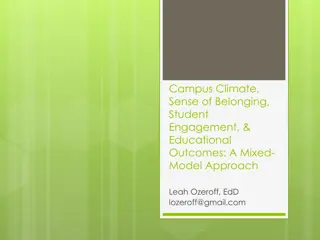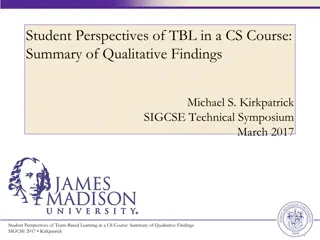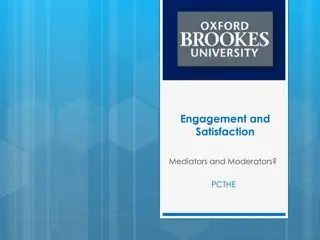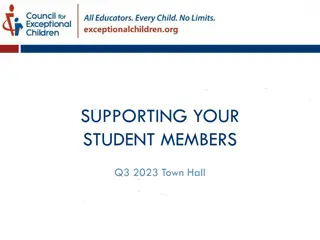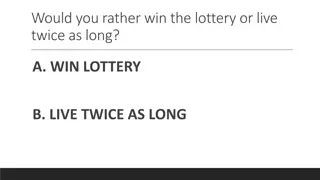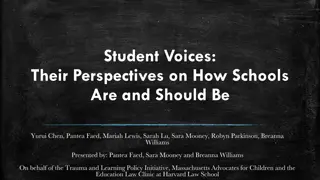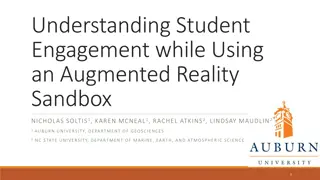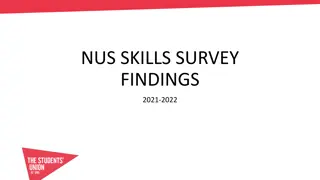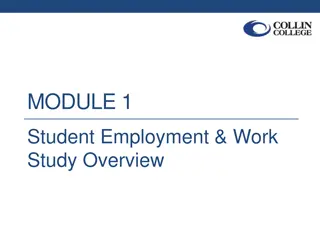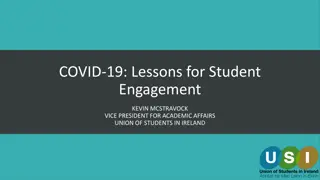Understanding Student Engagement: Perspectives and Findings
This presentation explores student engagement in higher education, covering definitions from literature, student perspectives, and key findings from a questionnaire. It delves into what constitutes engagement, the characteristics of engaged and disengaged students, and the role of educators in fostering engagement. Through discussions and survey results, it sheds light on how students perceive engagement and what factors contribute to their active participation and dedication.
Download Presentation

Please find below an Image/Link to download the presentation.
The content on the website is provided AS IS for your information and personal use only. It may not be sold, licensed, or shared on other websites without obtaining consent from the author. Download presentation by click this link. If you encounter any issues during the download, it is possible that the publisher has removed the file from their server.
E N D
Presentation Transcript
The UKs European university FROM THE HORSE S MOUTH / STUDENT PERSPECTIVES OF ENGAGMENT Amy Moses and Caroline Challans, CEWL, University of Kent
What well cover today What is student engagement? Discussion (what you think) Literature review What the student s think Key themes from a student questionnaire & focus groups What we can do? Suggested strategies Page 2
Definitions from the Literature The engaged studentis the student who has a positive, fulfilling and work-related state of mind that is characterised by vigour, dedication and absorption and who views him or herself as belonging to, and an active participant in, his or her learning communities (Baron & Corbin, 2012, p763) Disengagedstudents do not like reading the assigned books, they avoid participating in class discussions, they expect high grades for mediocre work, they ask for fewer assignments, they resent attendance requirements, they complain about course workloads, they do not like tough demanding professors, they do not adequately prepare for class (Trout, 1997, p46) Page 3
Discussion what is student engagement? Turn to people next to you and discuss the following questions: What is student engagement? Does it remain the same or does it change? How could you describe it? Do you think this differs to students ideas? What role do we play in this/who has the power? Page 4
The UKs European university OUR STUDY Approach and findings
What is student engagement answers from our students. Questionnaire: Participation in class discussions and activities (x22) Attendance at seminars, lectures and workshops (x16) Willingness to work hard (x15) Ability to hand work in on time and always prepared for class (x14) Being motivated and focussed on achieving your goals (x11) Interest in your subject (x9) Further comments: Attend the class but also be attentive in class goes beyond the classroom, you put your everything into it even if it s not a module you like, you have to find the passion within yourself Friendship it s not just about attendance, your friends make you go to seminars Boils down to your interest and dedication Page 6
Key themes - Questionnaire Students focusing on one step at a time with main reasons for pursuing IFP being: need, improve skills, interest in subject and to experience UK HEI Participation includes attendance (but not just physical presence), participation in class activities, students should be prepared and work hard Students felt engagement went beyond attendance but felt that motivation came from them Distractions included: lack of motivation, work unclear link to topic/interest, deadlines, sleep (too much/too little) and not knowing how to approach a problem. Page 7
Key themes Focus groups It s not you, it s me IFP is a period of becoming , a chance to make mistakes and become independent Teachers/staff play a critical role in building motivation and confidence but it s down to the student Friendship, socialisation and available support networks are important However, felt like a transition Supporting failure Student accountability Page 8
Key themes QAA (2012) UK Quality Code for HE Describes HE as transformational for the individual and with transactional elements Acknowledges how students are on an individual and collective learning journey Encourages each HE providers to agree a definitionof student engagement with their student body Recommends for this to be communicated to students via a student charter, student contract or similar document Page 9 Footer text
Key themes Kahu, E.R. (2011). Framing student engagement in higher education. Learning is emotional (p761) Can a student complete their work without being emotionally engaged? Difference between instrumental and intrinsic motivation Engagement is fundamentally situational it arises from the interplay of context and individual (p763) The responsibility for improving student engagementlies with the student, the teacher, the institution and the government (p769) Page 10
Key themes Mann S.J. (2001) Alternative Perspectives on the Student Experience: Alienation and engagement A new HE student is like a stranger in a foreign land (p11) From this outsider position students decide whether to join in and at what cost choice Alienation as a strategy for self-preservation Sometimes it is safer not to engage Too much emphasis placed on outcome (marking criteria and grades) rather than process(learning) encourages living uncreatively (p15) in the end, it is to obliterate the humanness in human action (quote from Bartlett, p9) Alienation from the self compliance Page 11
Key themes Bryson, C. (2014). Understanding and Developing Student Engagement Complex and impossible to measure Different ways of being a student - universities must consider what the individual brings, perceives and feels, desires and aspires to (p17) It is about process and outcome engaging students and studentsengaging Quality rather than quantity Focus on students Student engagement is at the centre of everything we do Page 12
But, what can we do? Please look around the room and choose a theme In groups discuss: What do you think about the feedback? What can we do to enhance engagement around this theme? Page 13
Suggested strategies involve them in this. goals (Zepke N. & Leach, N., 2010, p172). university. year. acknowledge this. strengths and encourage them to ask for feedback. It starts and ends with the student. Define student engagement at the start ask the students and A phased induction not too much information at the start. Look at student and institutional expectations (Student Charter). Encourage students to identify both their performance & learning Acknowledge and embrace the IFP as different from the rest of the Emphasis on transition (changing expectations) throughout the IFP There are many different ways of participating and we need to Encourage a positive approach to failure. Focus on student s Promote and support the Academic Peer Mentor scheme. Page 14
QUESTIONS? Amy Moses: a.moses@kent.ac.uk Caroline Challans: c.j.challans@kent.ac.uk Page 15
Bibliography Baron, P. & Corbin, L. (2012). Student engagement: rhetoric and reality, Higher Edu cation Research & Development, 31:6, p759-772 Bryson, C. (2014) Understanding and Developing Student Engagement, Routledge:London Kahu, E. R. (2011). Framing student engagement in higher education. Studies in Higher Education, 38:5, p758-773 Mann S.J. (2001) Alternative Perspectives on the Student Experience: Alienation and engagement. Studies in Higher Education, 26:1, p7-19 Quality Assurance Agency for Higher Education (2012). UK Quality Code for Higher Education; Part B: Assuring and Enhancing Academic Quality; Chapter B5: Student Engagement [online]. Available at http://www.qas.ac.uk/publications/information-and-guidance/uk-quality- code-for-higher-education-chapter-b5-student-engagement Trout, P.A. (1997). Disengaged students and the decline of academic standards. Academic Questions, 10:2, p46-55 Zepke, L. & Leach, N. (2010). Improving student engagement: Ten proposals for action. Active Learning in Higher Education, 11:3, p167-177 Page 16
THE UKS EUROPEAN UNIVERSITY www.kent.ac.uk









